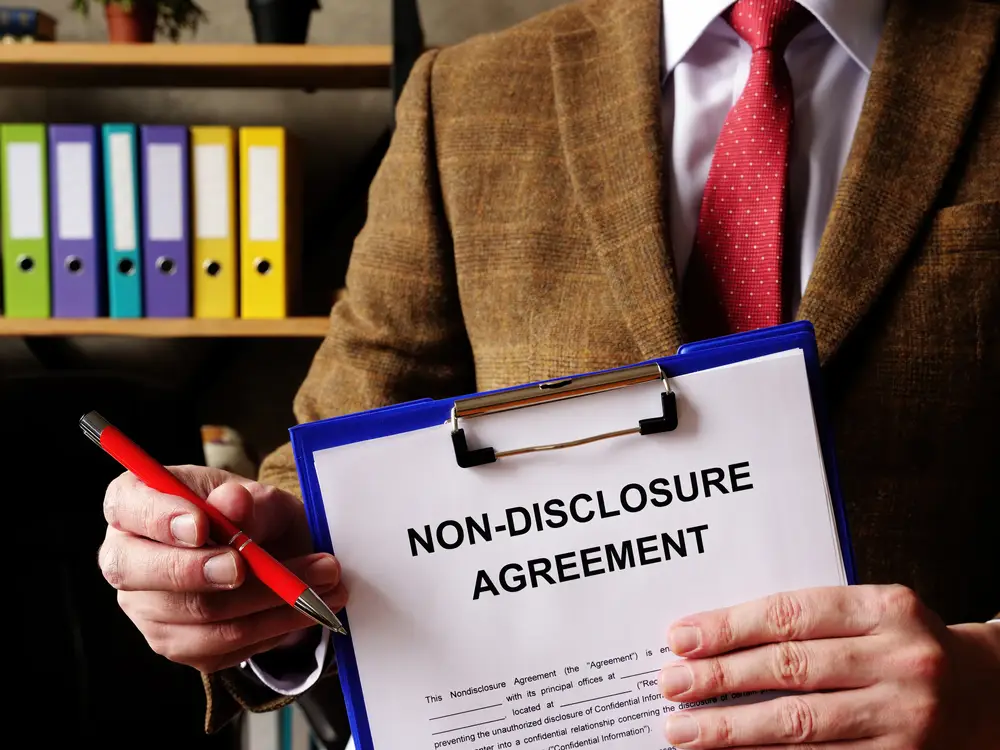A woman leaves a bar late at night and hails an Uber. On the way home, the driver makes an unexpected detour to a dark, abandoned parking lot, where he violates her trust and safety.
In another town, a teenage boy confides in his parish priest, only to have that trust manipulated and betrayed by the clergy member who should have protected him.
At a private boarding school, a coach exploits his authority over students, crossing boundaries and causing lasting harm.
In all three instances, the survivor, after filing a complaint, received compensation, but far less than what they should have received if they had been able to pursue full legal action, and not in a way that held the institution accountable.
What do these three incidents have in common besides the wrongful acts of the perpetrators? The survivors were forced to sign non-disclosure agreements (NDAs), due to the terms of service or policies set forth by these entities.
What Is an NDA?
A non-disclosure agreement (NDA) is a legal contract that restricts one or more parties from sharing certain information. In the context of sexual abuse/assault cases, NDAs often appear in settlement agreements. Survivors may be prohibited from publicly sharing their experiences, speaking about the institution’s role, or even warning others about potential dangers.
How NDAs Have Been Used in Sexual Abuse Cases
For decades, institutions ranging from churches to corporations have used NDAs to silence survivors and protect reputations. Survivors who accepted settlements were often left with compensation but stripped of their ability to speak out. This practice has allowed abusers to remain in positions of power and institutions to avoid public accountability. Prior to 2018, Uber’s terms of service included mandatory arbitration and class action waivers, forcing survivors into private, undisclosed resolutions instead of allowing them to pursue claims in court. (Learn more about Uber Driver Sexual Assault Lawsuits.)
Changing Laws Around NDAs
In recent years, states such as California and New York have passed laws limiting or banning NDAs in sexual harassment or sexual abuse cases. The STAND Act, passed in California, in 2018, prohibits the use of NDAs in settlements involving sexual harassment, discrimination, or assault, with an exception for when the survivor requests confidentiality.
–> Survivors seeking legal help from a California attorney specializing in abuse/assault cases can learn more here.
New York’s General Obligations Law limits confidentiality in settlements of claims involving discrimination, harassment or retaliation. An NDA can only be used if it is the complainant’s preference and after a 21-day review and 7-day revocation period; 2023 amendments further restricted what employers may require in these agreements.
–> Survivors seeking legal help from a New York attorney specializing in abuse/assault cases can learn more here.
On the federal level, the U.S. Congress enacted the Speak Out Act at the end of 2022. The legislation makes pre-dispute nondisclosure and non-disparagement clauses unenforceable in disputes involving sexual assault or sexual harassment. Separately, the 2022 Ending Forced Arbitration of Sexual Assault and Sexual Harassment Act bans pre-dispute mandatory arbitration for those claims. Together they curb secrecy and forced private forums at the federal level, but they don’t prohibit survivor-requested confidentiality in a post-dispute settlement.
Across the United States, nearly 20 states have enacted laws restricting the use of NDAs in workplace sexual harassment and discrimination cases. These laws were designed to stop employers from silencing employees who experienced harassment. States that have passed this type of legislation retains the ability of employees to share their stories or warn others, even after a settlement.
However, when it comes to sexual assault or abuse more broadly, far fewer states extend these protections outside of employment. The legal landscape is fragmented: some states limit NDAs in all settlement agreements involving sexual misconduct, while others focus only on the workplace. This patchwork leaves many survivors vulnerable to being pressured into secrecy, depending on where their abuse occurred.
These reforms are part of a larger movement to prevent institutions from silencing survivors. Still, rules vary widely depending on the state, and many survivors remain unaware of their rights when presented with confidentiality agreements.
What Survivors Should Ask Before Signing
Survivors facing the possibility of an NDA should ask important questions: What exactly am I agreeing not to disclose? Will this prevent me from telling my story publicly or warning others? Can I still report the abuse to law enforcement? How might this affect my healing process? These questions are crucial in understanding how an NDA may impact both personal recovery and the pursuit of justice.
NDAs Can Silence Survivors
Confidentiality agreements often prevent survivors from warning others or holding institutions accountable. Before signing anything, ask questions and talk to an attorney who specializes in sexual abuse cases. You may have options that protect your privacy without giving up your voice.
How an Attorney Can Help
An attorney specializing in sexual abuse cases can review settlement offers and fight against overbroad NDAs. Attorneys can sometimes negotiate for narrower agreements that protect survivor privacy without silencing their voice entirely. The mission of SurvivorsRights.com is to help connect survivors with attorneys who understand the balance between protecting confidentiality and preserving the right to speak out.
Alternatives to NDAs
Survivors and their attorneys can seek alternatives, such as settlements with limited confidentiality (restricting only financial details) or agreements that explicitly preserve the survivor’s right to share their story. In some cases, survivors may reject confidentiality altogether to ensure institutions are publicly held accountable.
NDAs and confidentiality agreements can have lasting consequences, not only for survivors but for communities that remain unaware of abusive patterns. Survivors deserve transparency, choice, and the ability to make informed decisions about their cases. Before signing any agreement, survivors should consult an attorney who can explain the full impact of confidentiality clauses and explore alternatives.
